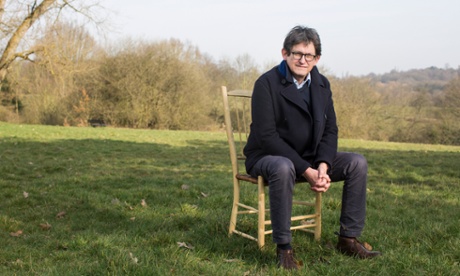The argument for divesting from fossil fuels is becoming overwhelming
The world has much more coal, oil and gas in the ground than it can safely burn. That much is physics.
Anyone studying the question with an open mind will almost certainly come to a similar conclusion: if we and our children are to have a reasonable chance of living stable and secure lives 30 or so years from now, according to one recent study 80% of the known coal reserves will have to stay underground, along with half the gas and a third of the oil reserves.
If only science were enough.
If not science, then politics? MPs, presidents, prime ministers and members of congress are always telling us (often suggesting a surrender of civil liberties in return) that their first duty is the protection of the public.
But politics sometimes struggles with physics. Science is, at its best, long term and gives the best possible projection of future risk. Which is not always how politics works, even when it comes to our security. Politicians prefer certainty and find it difficult to make serious prudent planning on high probabilities.
On climate change, the public clamour is in inverse proportion to the enormity of the long-term threat. If only it were the other way round. And so, year after year, the people who represent us around the UN negotiating tables have moved inches, not miles.
When, as Guardian colleagues, we first started discussing this climate change series, there were advocates for focusing the main attention on governments. States own much of the fossil fuels that can never be allowed to be dug up. Only states, it was argued, can forge the treaties that count. In the end the politicians will have to save us through regulation – either by limiting the amount of stuff that is extracted, or else by taxing, pricing and limiting the carbon that’s burned.
If journalism has so far failed to animate the public to exert sufficient pressure on politics through reporting and analysis, it seemed doubtful whether many people would be motivated by the idea of campaigning for a paragraph to be inserted into the negotiating text at the UN climate talks in Paris this December. So we turned to an area where campaigners have recently begun to have marked successes: divestment.
There are two arguments in favour of moving money out of the biggest and most aggressive fossil fuel companies – one moral, the other financial.
The moral crusaders – among them Archbishop Desmond Tutu – see divestment from fossil fuels in much the same light as earlier campaigners saw the push to pull money out of tobacco, arms, apartheid South Africa – or even slavery. Most fossil fuel companies, they argue, have little concern for future generations. Of course, the companies are run by sentient men and women with children and grandchildren of their own. But the market pressures and fiduciary duties involved in running public companies compel behaviour that is overwhelmingly driven by short-term returns.
So – the argument goes – the directors will meanwhile carry on business as usual, no matter how incredible it may seem that they will be allowed to dig up all the climate-warming assets they own. And, by and large – and discounting recent drops in the price of oil – they continue to be reasonably good short-term businesses, benefiting from enormous subsidies as they search for even more reserves that can never be used.
The pragmatists argue the case on different grounds. It is simply this: that finance will eventually have to surrender to physics.
If – eventually – the companies cannot, for the sake of the human race, be allowed to extract a great many of the assets they own, then many of those assets will in time become valueless. So people with other kinds of fiduciary duty – people, say, managing endowments, pension funds and investment portfolios – will want to get their money out of these companies before the bubble bursts.

Of course, the financial risk comes not simply from the threat of regulation, but could also be hastened by the march of alternative clean energy. Global investment in clean energy jumped 16% in 2014 to £205bn, but because of the rapid drop in the price of that energy (the cost of solar has dropped by two-thirds in 6 years), the money invested last year bought almost double the amount of electricity capacity as in 2011.
So there’s a risk calculation to be done by anyone invested in fossil fuels – which, one way or another, is probably most of us. Get out too early and you might forgo the reasonable returns based on current performance and the book value of the assets that are notionally exploitable.
But what of the risk of being a late exiter? Do you wait and judge when the politicians could finally summon the will to start making regulatory and market interventions … and then get out? And at the same time as everyone else is trying to do the same?
This is why the divestment movement has changed from being a fringe campaign to something every responsible fund manager can no longer ignore. How could they, when even the governor of the Bank of England, Mark Carney, has warned that the “vast majority of reserves are unburnable” and the bank itself is conducting an inquiry into the risk that inflated fossil fuel assets pose to the stability of the financial system?
When the president of the World Bank, Jim Yong Kim, urges: “Be the first mover. Use smart due diligence. Rethink what fiduciary responsibility means in this changing world. It’s simple self-interest. Every company, investor and bank that screens new and existing investments for climate risk is simply being pragmatic”?
When the Bank of England’s deputy head of supervision for banks and insurance companies, Paul Fisher, warns, as he did this month: “As the world increasingly limits carbon emissions, and moves to alternative energy sources, investments in fossil fuels – a growing financial market in recent decades – may take a huge hit”?
Or listen to Hank Paulson, no bleeding liberal, but secretary of the Treasury under Bush and former CEO of Goldman Sachs: “Each of us must recognise that the risks are personal. We’ve seen and felt the costs of underestimating the financial bubble. Let’s not ignore the climate bubble.”
President Obama puts it most pithily: “We’re not going to be able to burn it all.”
So the argument for a campaign to divest from the world’s most polluting companies is becoming an overwhelming one, on both moral and pragmatic grounds. But the divestment movement is sometimes misunderstood. The intention is not to bankrupt the companies, nor to promote overnight withdrawal from fossil fuels – that would not be possible or desirable.
Divestment serves to delegitimise the business models of companies that are using investors’ money to search for yet more coal, oil and gas that can’t safely be burned. It is a small but crucial step in the economic transition away from a global economy run on fossil fuels.
The usual rule of newspaper campaigns is that you don’t start one unless you know you’re going to win it. This one will almost certainly be won in time: the physics is unarguable. But we are launching our campaign today in the firm belief that it will force the issue now into the boardrooms and inboxes of people who have billions of dollars at their disposal.
It’s clear, from our researches over the past few weeks, that many company directors and fund managers have had a nagging feeling that this is something coming up the agenda that – one day – they will have to think about. As the Guardian’s campaign mounts, we hope they will appreciate that there is some urgency about the choices they make.
Who will take the lead? Some huge endowments and investment funds have already announced that they will be decarbonising their portfolios, exiting fossil fuels altogether and/or investing in cleaner alternatives.
They include the Rockefeller Brothers Fund; Stanford, Glasgow and Australian National Universities; the British Medical Association; Norway’s Government Pension Fund Global, which has sold off 32 coal companies on climate and environmental grounds; AP4, the giant Swedish pension fund; and many other faith groups, local councils and asset managers. The World Council of Churches has committed not to invest.
Our own campaign will give readers the information they need to make their own investment decisions and to apply pressure on the workplaces, unions, schools, colleges, churches, NGOs, pension advisers and charities in their lives. But we also want to try to change minds at one or two institutions that have demonstrated inspiring thought leadership in other spheres of life.

The Wellcome Trust handles a portfolio of more than £18bn and invests around £700m a year in science, the humanities, social science education and medical research. The Bill and Melinda Gates Foundation has an endowment of .5bn. Last year it gave away .9bn in grants towards health and sustainable development.
In 2014 the Wellcome Trust had £564m invested in Shell, BP, Schlumberger, Rio Tinto and BHP Billiton alone. The Gates Foundation has a financial stake of over bn in fossil fuel companies.

By most standards, these are huge sums of money, helping to fund the extraction of unusable oil gas and coal on a massive scale. But, as a proportion of the foundations’ own endowments, they are relatively small – just a few percent for the fossil fuel investments we know about. So they could, we think, be divested without damaging overall returns. Indeed, we think they could achieve higher and, over time, safer returns by putting their money into other investments with real opportunities for growth in a world tackling climate change
Because both foundations are a) so progressive in their aims and actions and b) have human health and science at the heart of everything they do, we hope they, of all institutions, will see the force of the call for them to move their money out of a sector whose actions, if unchecked, could cause the most devastating harm to the health of billions. A landmark report by the Lancet and University College London concluded in 2009: “Climate change is the biggest global health threat of the 21st century.”
The ask of them is, we think, both modest and simple. We understand that fund managers do not like to make sudden changes to their portfolios. So we ask that the Gates Foundation and Wellcome Trust commit now to divesting from the top 200 fossil fuel companies within five years. And that they immediately freeze any new investment in the same companies.
We will, of course, suggest that the Guardian Media Group does the same, and keeps you informed about its own deliberations and decisions.
Please sign, retweet and generally spread news about the petition. In everything we say to these foundations, we will emphasise that we come in admiration for what they have done, and continue to do for human health and wellbeing. They aren’t the “bad guys”. But they could certainly show themselves to be the good guys in this matter of life and death.
One final thing. This campaign is going to be backed up by much reporting and analysis. We would be very pleased to hear from anyone working in the fossil fuel industries at a senior level, either currently or recently. We are interested, for instance, to learn about internal discussions and papers about the state of knowledge and debate about the environmental harm caused by the extractive industries. You can email me confidentially at alan.rusbridger@theguardian.com; see my PGP key on @arusbridger on Twitter; or use the Guardian’s encrypted securedrop platform, which enables anyone to send us documents without being traced.
- Follow the campaign on #keepitintheground
guardian.co.uk © Guardian News & Media Limited 2010
Published via the Guardian News Feed plugin for WordPress.




